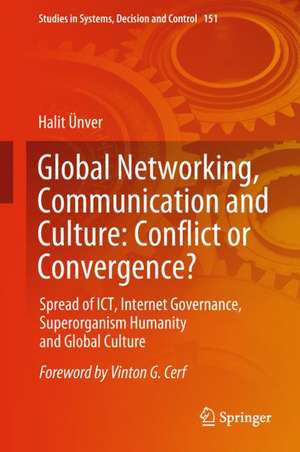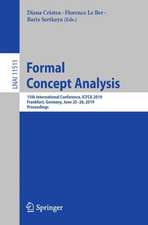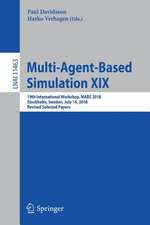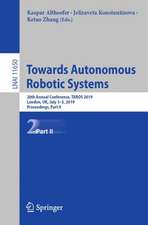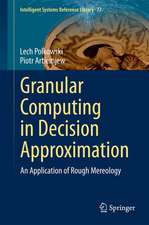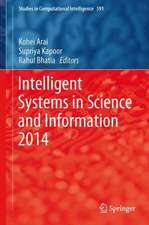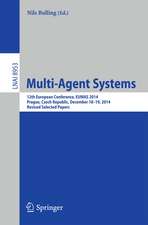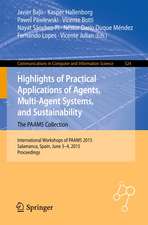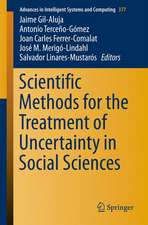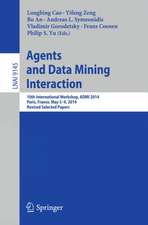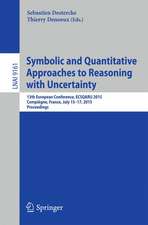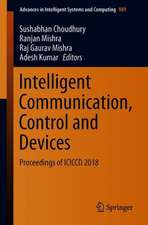Global Networking, Communication and Culture: Conflict or Convergence?: Spread of ICT, Internet Governance, Superorganism Humanity and Global Culture: Studies in Systems, Decision and Control, cartea 151
Autor Halit Ünveren Limba Engleză Hardback – 27 mar 2018
Pursuing an interdisciplinary approach, this book offers detailed insights into the empirical relationships between overall social key figures of states and cultures in the fields of information and communication technology (ICT) (digital divide/inequality), the economy, education and religion. Its goal is to bridge the ‘cultural gap’ between computer scientists, engineers, economists, social and political scientists by providing a mutual understanding of the essential challenges posed and opportunities offered by a global information and knowledge society.
In a sense, the historically unprecedented technical advances in the field of ICT are shaping humanity at different levels and forming a hybrid (intelligent) human-technology system, a so-called global superorganism. The main innovation is the combined study of digitization and globalization in the context of growing social inequalities, collapse, and sustainable development, and how a convergencetowards a kind of global culture could take place. Accordingly, the book discusses the spread of ICT, Internet Governance, the balance between the central concentration of power and the extent of decentralized power distribution, the inclusion or exclusion of people and states in global communication processes, and the capacity for global empathy or culture.
| Toate formatele și edițiile | Preț | Express |
|---|---|---|
| Paperback (1) | 647.79 lei 6-8 săpt. | |
| Springer International Publishing – 30 ian 2019 | 647.79 lei 6-8 săpt. | |
| Hardback (1) | 654.21 lei 6-8 săpt. | |
| Springer International Publishing – 27 mar 2018 | 654.21 lei 6-8 săpt. |
Din seria Studies in Systems, Decision and Control
- 18%
 Preț: 937.89 lei
Preț: 937.89 lei - 18%
 Preț: 729.53 lei
Preț: 729.53 lei - 20%
 Preț: 627.40 lei
Preț: 627.40 lei - 15%
 Preț: 644.18 lei
Preț: 644.18 lei - 18%
 Preț: 900.80 lei
Preț: 900.80 lei - 18%
 Preț: 947.35 lei
Preț: 947.35 lei - 20%
 Preț: 1467.93 lei
Preț: 1467.93 lei - 15%
 Preț: 646.30 lei
Preț: 646.30 lei - 18%
 Preț: 1012.84 lei
Preț: 1012.84 lei - 15%
 Preț: 653.33 lei
Preț: 653.33 lei - 9%
 Preț: 655.01 lei
Preț: 655.01 lei - 20%
 Preț: 835.23 lei
Preț: 835.23 lei - 18%
 Preț: 1112.30 lei
Preț: 1112.30 lei - 20%
 Preț: 934.24 lei
Preț: 934.24 lei - 24%
 Preț: 726.59 lei
Preț: 726.59 lei - 18%
 Preț: 1004.81 lei
Preț: 1004.81 lei - 20%
 Preț: 924.72 lei
Preț: 924.72 lei - 18%
 Preț: 1010.48 lei
Preț: 1010.48 lei - 20%
 Preț: 932.21 lei
Preț: 932.21 lei - 18%
 Preț: 1007.35 lei
Preț: 1007.35 lei - 18%
 Preț: 752.43 lei
Preț: 752.43 lei - 18%
 Preț: 1000.24 lei
Preț: 1000.24 lei - 18%
 Preț: 999.45 lei
Preț: 999.45 lei - 18%
 Preț: 1016.81 lei
Preț: 1016.81 lei - 18%
 Preț: 949.73 lei
Preț: 949.73 lei - 18%
 Preț: 1119.38 lei
Preț: 1119.38 lei - 18%
 Preț: 1412.20 lei
Preț: 1412.20 lei - 20%
 Preț: 1163.21 lei
Preț: 1163.21 lei - 18%
 Preț: 1116.26 lei
Preț: 1116.26 lei - 18%
 Preț: 783.20 lei
Preț: 783.20 lei - 18%
 Preț: 952.09 lei
Preț: 952.09 lei - 20%
 Preț: 1472.54 lei
Preț: 1472.54 lei - 18%
 Preț: 1392.46 lei
Preț: 1392.46 lei - 20%
 Preț: 1180.52 lei
Preț: 1180.52 lei - 18%
 Preț: 1567.67 lei
Preț: 1567.67 lei - 20%
 Preț: 984.18 lei
Preț: 984.18 lei - 20%
 Preț: 369.86 lei
Preț: 369.86 lei - 20%
 Preț: 1281.17 lei
Preț: 1281.17 lei - 18%
 Preț: 1582.67 lei
Preț: 1582.67 lei - 18%
 Preț: 1112.30 lei
Preț: 1112.30 lei - 20%
 Preț: 1055.94 lei
Preț: 1055.94 lei - 18%
 Preț: 1405.90 lei
Preț: 1405.90 lei - 18%
 Preț: 961.55 lei
Preț: 961.55 lei - 20%
 Preț: 1053.48 lei
Preț: 1053.48 lei - 20%
 Preț: 1049.37 lei
Preț: 1049.37 lei - 18%
 Preț: 1005.74 lei
Preț: 1005.74 lei - 18%
 Preț: 1225.94 lei
Preț: 1225.94 lei - 18%
 Preț: 1232.26 lei
Preț: 1232.26 lei
Preț: 654.21 lei
Preț vechi: 817.77 lei
-20% Nou
Puncte Express: 981
Preț estimativ în valută:
125.18€ • 131.05$ • 103.58£
125.18€ • 131.05$ • 103.58£
Carte tipărită la comandă
Livrare economică 05-19 aprilie
Preluare comenzi: 021 569.72.76
Specificații
ISBN-13: 9783319764474
ISBN-10: 3319764470
Pagini: 299
Ilustrații: XXXII, 311 p. 79 illus., 75 illus. in color.
Dimensiuni: 155 x 235 mm
Greutate: 0.66 kg
Ediția:1st ed. 2018
Editura: Springer International Publishing
Colecția Springer
Seria Studies in Systems, Decision and Control
Locul publicării:Cham, Switzerland
ISBN-10: 3319764470
Pagini: 299
Ilustrații: XXXII, 311 p. 79 illus., 75 illus. in color.
Dimensiuni: 155 x 235 mm
Greutate: 0.66 kg
Ediția:1st ed. 2018
Editura: Springer International Publishing
Colecția Springer
Seria Studies in Systems, Decision and Control
Locul publicării:Cham, Switzerland
Cuprins
Introduction.- Fundamentals.- State of Affairs.- Global Networking: Relation to Economic Performance and Education Level.- Global Networking and Worldview.- Global Networking, Power and Control Issues.- The Global Superorganism as an Intelligent Human Technology System.- The Global Superorganism as an Intelligent Human-Technology System.- Closing Remarks.
Textul de pe ultima copertă
“Efforts to develop the Internet protocols were international from the beginning. The Internet has significantly contributed to globalization processes and transcultural interactions which will continue into the future… Bridging the cultural gap between the technical and political communities should not be underestimated as cooperation between these two stakeholders plays a central role, especially in the digital transformation of society… As the system evolved and spread, we hoped that the Internet and the technologies that support it could contribute to greater democracy, freedom of speech and human rights worldwide… There is no guarantee that a single, global society will emerge from the widespread use of the Internet and ICTs.”
Vinton G. Cerf
“This book gives deep insights into global networking processes and a signal that can stimulate hope. At least for one of the most powerful technologies available in the world, we have similar attitudes worldwide and between all cultures, concerning usage. We see clear convergence in access and usage which is due to the relative low cost of technology, its huge enabling potential to mobilize people and the increasing emphasis on education as well as higher income worldwide.”
Franz Josef Radermacher
“Mr. Ünver has his finger on the pulse of our times and demonstrates clearly and comprehensively, with his elaborations, that communication media offers, more than anything else, the chance for establishing global balance. He states clearly that it is not cultural or even religious differences that hinder the use or access to these technologies. Rather, the divergent use of communication technologies results from differing conditions concerning prosperity and education. Through his book, he supports the global demand of taking a path towards more balanced income and education levels, in line with the positions of the United Nations, OECD and the European Union.”
Rainer Wieland
The interdisciplinary approach of this book gives detailed insights into empirical relationships between overall social key figures of states and cultures in the fields of ICT (digital divide/inequality), economy, education, and religion. In a sense, the historically singular technical progress in the field of ICT shapes humanity at different levels and develops a hybrid (intelligent) human-technology system, a so-called global superorganism. The main innovation is the combined study of digitization and globalization in the context of increasing social inequality, collapse, and sustainable development and how a convergence towards a kind of global culture can take place. Thereby, the spread of ICT, Internet Governance, balance between the central concentration of power and the extent of decentralized power distribution, the inclusion or exclusion of people and states in global communication processes, and the capacity for global empathy or culture are discussed. The book intends to bridge the ‘cultural gap’ between computer scientist, engineers, economists, social and political scientists by providing a mutual understanding of essential challenges and possibilities of a global information and knowledge society.
Halit Ünver
Vinton G. Cerf
“This book gives deep insights into global networking processes and a signal that can stimulate hope. At least for one of the most powerful technologies available in the world, we have similar attitudes worldwide and between all cultures, concerning usage. We see clear convergence in access and usage which is due to the relative low cost of technology, its huge enabling potential to mobilize people and the increasing emphasis on education as well as higher income worldwide.”
Franz Josef Radermacher
“Mr. Ünver has his finger on the pulse of our times and demonstrates clearly and comprehensively, with his elaborations, that communication media offers, more than anything else, the chance for establishing global balance. He states clearly that it is not cultural or even religious differences that hinder the use or access to these technologies. Rather, the divergent use of communication technologies results from differing conditions concerning prosperity and education. Through his book, he supports the global demand of taking a path towards more balanced income and education levels, in line with the positions of the United Nations, OECD and the European Union.”
Rainer Wieland
The interdisciplinary approach of this book gives detailed insights into empirical relationships between overall social key figures of states and cultures in the fields of ICT (digital divide/inequality), economy, education, and religion. In a sense, the historically singular technical progress in the field of ICT shapes humanity at different levels and develops a hybrid (intelligent) human-technology system, a so-called global superorganism. The main innovation is the combined study of digitization and globalization in the context of increasing social inequality, collapse, and sustainable development and how a convergence towards a kind of global culture can take place. Thereby, the spread of ICT, Internet Governance, balance between the central concentration of power and the extent of decentralized power distribution, the inclusion or exclusion of people and states in global communication processes, and the capacity for global empathy or culture are discussed. The book intends to bridge the ‘cultural gap’ between computer scientist, engineers, economists, social and political scientists by providing a mutual understanding of essential challenges and possibilities of a global information and knowledge society.
Halit Ünver
Caracteristici
Presents a study of globalization and the diverse cultures representing the transition to a digital future in the context of sustainable development Focuses on convergence and the current divides characterizing technology use in the information age, particularly the most recent and most powerful one: the Internet Provides detailed analyses employing extensive statistical and mathematical methods Includes forewords from Vinton G. Cerf, Google Vice President and Rainer Wieland, Vice President of the European parliament
